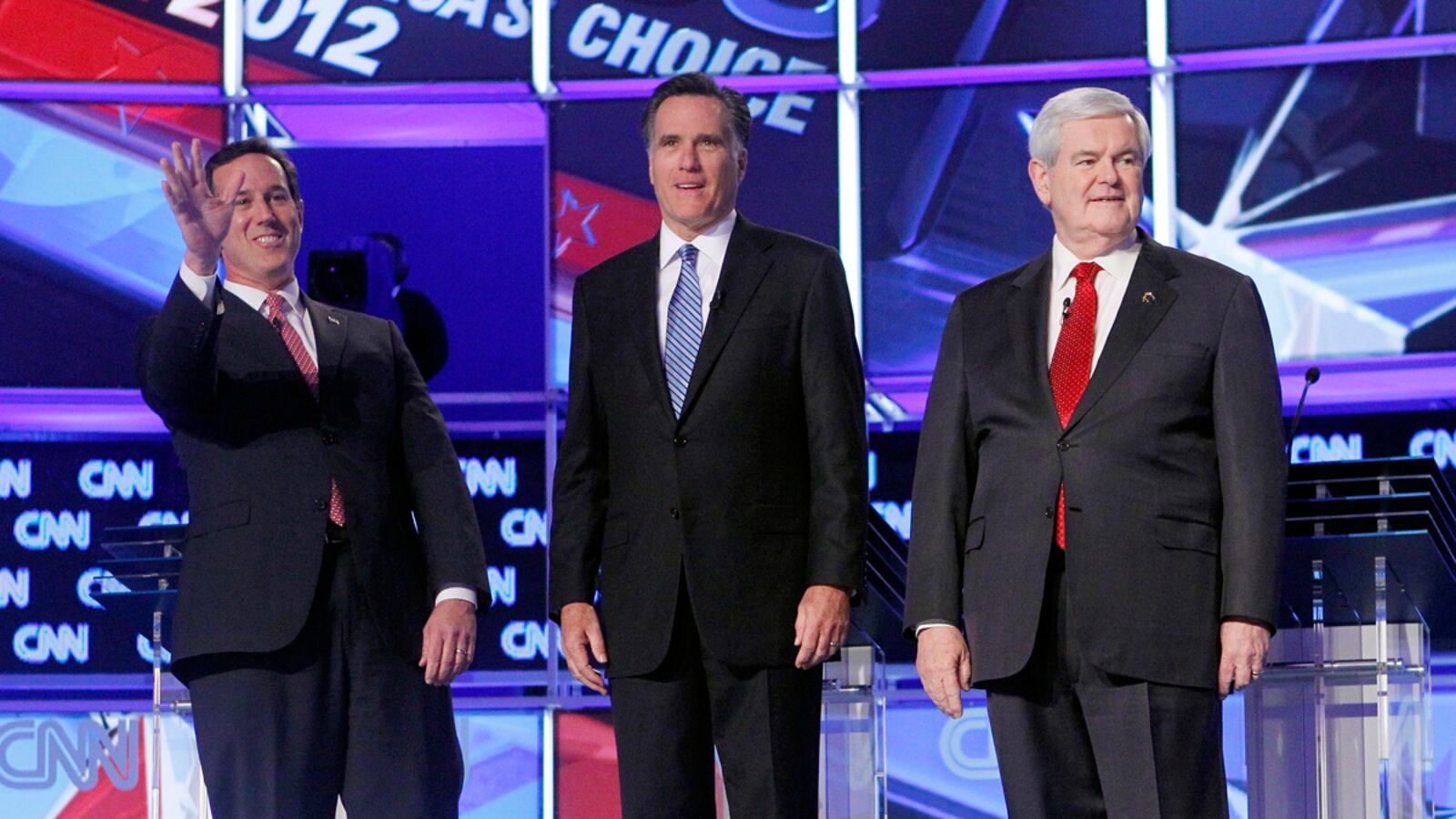Newt Gingrich thinks that because CNN’s John King asked about his personal life last week, the “elite, liberal media” is out to get Republican presidential candidates. Nonsense. If journalists really wanted to make Gingrich and his fellow GOP frontrunners squirm, they’d ask why they supported the war in Iraq.

It’s no secret that American political culture often suffers from amnesia. Still, there’s something amazing about the fact that Gingrich, Rick Santorum and Mitt Romney can breezily advocate war with Iran without ever having to explain what their support for the Iraq War says about their judgment on matters of war and peace.
In a debate last November, Gingrich said that if other methods fail, “you have to take whatever steps are necessary to break its [the Iranian government’s] capacity to have a nuclear weapon.” He’s also promised to nominate as his secretary of state former Bush administration United Nations ambassador John Bolton, a man who has said that the only remaining “option is to take preemptive military action to break Iran’s program.”
This is the same Gingrich who soon after Sept. 11 said that “if we don’t use this as the moment to replace Saddam after we replace the Taliban, we are setting the stage for disaster.” In 2003, Gingrich lauded Donald Rumsfeld while declaring that the lesson of the Iraq War was that the State Department—the one institution whose intelligence agency warned that Saddam did not have weapons of mass destruction—had failed.
Then there’s Rick Santorum, who has said the U.S. should “degrade those [Iran’s] facilities through airstrikes.” Back in 2003, Santorum demanded that the U.S. invade Iraq to stop “the rise of radical Islam.” Santorum never quite explained how Saddam Hussein—a secularist who enjoyed torturing ayatollahs to death—represented “radical Islam.” But that was only the beginning of Santorum’s inanities, which included a 2002 assurance that, “There is a parallel between today’s situation [with Iraq] and the situation that confronted the civilized Western World of the 1930s” and a 2006 insistence that the Iraq War was part of America’s decision to “retaliate for the damage” done on 9/11.
And let’s not forget Mitt Romney, who last November argued that if sanctions and covert action fail, “then of course you take military action” against Iran. In 2008, he said, just as glibly, that “It was the right decision to go into Iraq. I supported it at the time; I support it now.”
The point is not that candidates who support a failed war should be disqualified from high office. Plenty of people mistakenly supported the Iraq War, including me. But surely the media should make Gingrich, Santorum and Romney explain what they’ve learned from being wrong, and why we should trust them again.
Those questions are particularly important because, despite the myriad differences between invading Iraq and bombing Iran, the debate over the latter echoes the debate over the former in one crucial way. In 2002 and 2003, it was generals and career foreign policy professionals—people like Eric Shinseki, Anthony Zinni, Richard Clarke and Joe Wilson—who came out most strongly against war. They were drowned out by a group of hawkish politicians, political appointees and commentators who insisted that the threat from Iraq was much greater than the soldiers and spooks understood, and that invading Iraq would prove much easier.
The Iran debate has followed the same pattern. Once again, the career military and intelligence officials are dubious. In 2010, Chairman of the Joint Chiefs of Staff Mike Mullen said about attacking Iran: “In an area that’s so unstable right now, we just don’t need more of that.” Even George W. Bush’s former CIA director, Gen. Michael Hayden, recently warned against attacking Iran unless the threat is “imminent.” Another former Bush administration CIA director, John McLaughlin, has called bombing “a very bad option.” In Israel too, Meir Dagan, the recently retired head of Israel’s external security service, the Mossad, has called an attack “one of the stupidest ideas I’ve ever heard.” His successor, Tamir Pardo, has cast doubt on the idea that an Iranian nuclear weapon would constitute an “existential” threat to the Jewish state.
Arrayed against these intelligence professionals and military men are many of the same right-wing politicos who pushed for the Iraq War, folks like Dick Cheney, John Bolton and Newt Gingrich in the United States, and their Israeli equivalent, Benjamin Netanyahu. What distinguishes these Iran hawks is their apocalyptic view of every foreign threat. During the Cold War, Cheney, Gingrich and Bolton insisted that the U.S.S.R. was about to bury the U.S. Then, in the 1990s, they hyped the danger from China. After 9/11, it was Iraq. Now, it’s Iran. Similarly, Netanyahu now calls Iran the equivalent of Nazi Germany, but in the 1990s he repeatedly used the same analogy to rail against the threat of a Palestinian state.
The extraordinary thing about today’s Iran debate is that being wrong about Iraq has barely undermined the hawks’ influence at all. In 2012, as in 2002, Republicans are driving the political discussion, and in 2012, as in 2002, Democrats are petrified about being seen as too soft. Once again the media, which did not cover itself with glory in the run-up to Iraq, bears part of the blame. To allow Gingrich, Santorum and Romney to saber-rattle on Iran, as they have in debate after debate, without forcing them to confront the consequences of their saber-rattling on Iraq, is professional malpractice. If I were John King—or his equivalent on another network—I’d force Gingrich to answer that question in every foreign-policy segment of every debate. Let’s see Newt demagogue his way out of that one.






